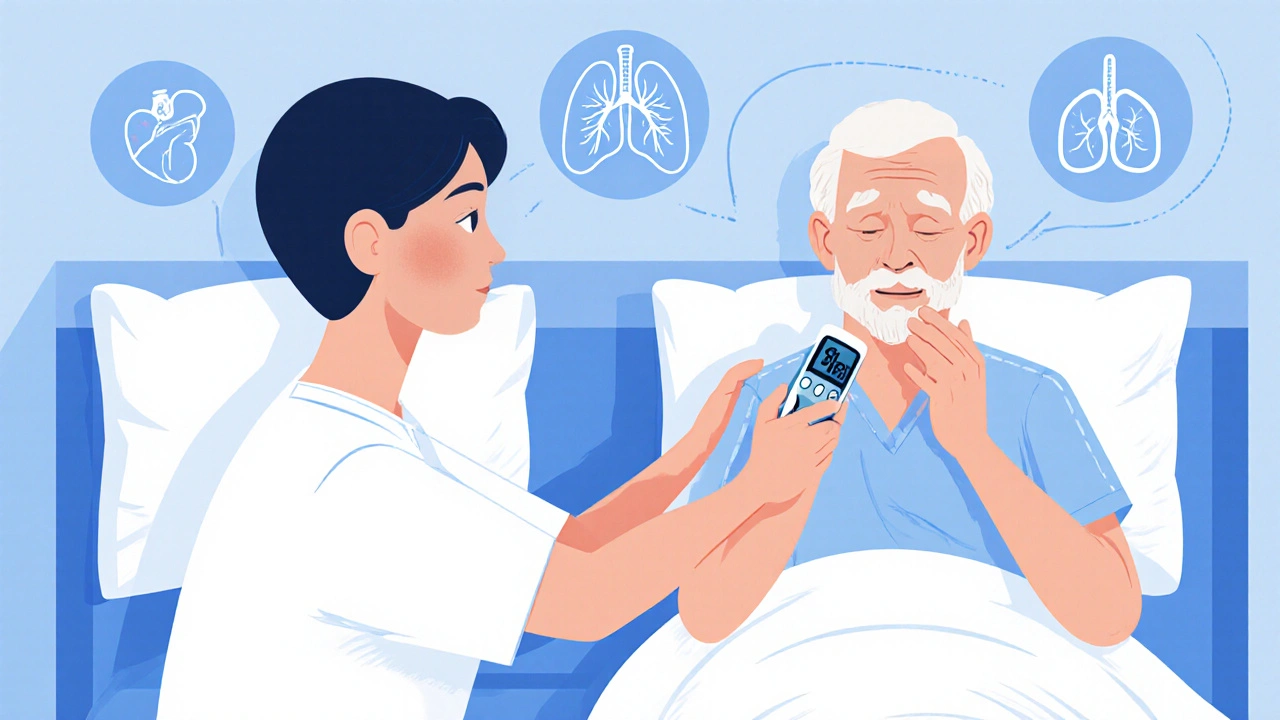Flu Risk Assessment for Seniors
Understanding Flu Risk in Older Adults
This tool helps assess key risk factors and symptoms that make influenza particularly dangerous for seniors. Enter your information below to get personalized insights.
Enter your details and click "Assess Flu Risk" to see personalized risk factors and recommendations.
Common Flu Symptoms in Seniors
Low-grade Fever
May be absent or mild in older adults.
Confusion
Sudden mental changes are a warning sign.
Fatigue
Unexpected weakness or exhaustion.
Vaccine Comparison for Seniors (2025)
| Vaccine Type | Dose | Efficacy in 65+ | Key Feature |
|---|---|---|---|
| Standard-dose (quadrivalent) | 0.5 ml | ~45% | Broad strain coverage |
| High-dose (quadrivalent) | 0.5 ml | ~60% | Four-fold antigen amount |
| Adjuvanted (quadrivalent) | 0.5 ml | ~55% | Immune-boosting adjuvant |
| Recombinant (quadrivalent) | 0.5 ml | ~58% | Egg-free production |
When it comes to seniors, influenza is a respiratory virus that spreads easily during the winter months and can hit older adults harder than younger people. Influenza causes fever, cough, body aches, and in severe cases can lead to pneumonia or hospitalization. Flu in the elderly presents unique challenges because the immune system weakens with age and many seniors live with chronic conditions.
Why Seniors Face Higher Risks
Understanding the risk profile helps caregivers and health workers focus on the right actions. The biggest culprits are:
- Immunosenescence - the natural decline of immune function that starts around age 65. It reduces the body’s ability to produce antibodies quickly.
- Comorbidities - heart disease, diabetes, chronic lung disease, and kidney problems are common in older adults and make flu complications more likely.
- Living Situation - shared housing, nursing homes, and frequent visits to health clinics increase exposure to the virus.
- Reduced Vaccine Response - older bodies often produce a lower antibody count after a standard flu shot.
Data from the Australian Department of Health in 2024 showed that people aged 65+ accounted for 80% of flu‑related hospital admissions despite representing only 15% of the population.
Typical Symptoms in Older Adults
Flu symptoms can look different in seniors. While younger people often report a sudden high fever, older adults may experience milder or atypical signs.
- Low‑grade fever or no fever at all - body temperature may stay under 38°C (100.4°F).
- Persistent cough - dry or producing sputum, sometimes confused with a chronic bronchitis flare.
- Fatigue and weakness - a sudden drop in energy that can lead to falls.
- Confusion or delirium - especially in those with dementia, abrupt mental changes are a red flag.
- Loss of appetite and dehydration - reduced fluid intake can quickly cause electrolyte imbalance.
- Muscle aches and joint pain - often described as “body aches” that limit mobility.
Because the classic “flu” picture may be muted, it’s crucial for caretakers to watch for any sudden health change during flu season.

When to Seek Medical Help
Prompt treatment can keep complications at bay. Call a health professional right away if an older adult shows any of the following:
- Rapid breathing or shortness of breath.
- Chest pain or pressure.
- Persistent high fever (>39°C / 102°F) lasting more than 48 hours.
- Signs of dehydration - dry mouth, dizziness, dark urine.
- New or worsening confusion.
- Symptoms that last longer than a week without improvement.
Early antiviral therapy, such as oseltamivir (Tamiflu), works best when started within 48hours of symptom onset.
Prevention Strategies that Really Work
Prevention is a multi‑layered approach. No single measure guarantees safety, but together they dramatically lower risk.
1. Annual Influenza Vaccination
The cornerstone of protection is the yearly flu shot. For seniors, Australia recommends one of the following formulations:
| Vaccine Type | Typical Dose | Reported Efficacy in 65+ | Key Feature |
|---|---|---|---|
| Standard‑dose (quadrivalent) | 0.5ml | ~45% | Broad strain coverage |
| High‑dose (quadrivalent) | 0.5ml | ~60% | Four‑fold antigen amount |
| Adjuvanted (quadrivalent) | 0.5ml | ~55% | Immune‑boosting adjuvant |
| Recombinant (quadrivalent) | 0.5ml | ~58% | Egg‑free production |
Studies in 2024 showed that high‑dose and adjuvanted vaccines cut hospital admissions among 65‑plus Australians by roughly one third compared with the standard dose.
2. Hand Hygiene & Respiratory Etiquette
Simple habits go a long way:
- Wash hands with soap for at least 20seconds, especially after coughing or touching shared surfaces.
- Carry an alcohol‑based hand sanitizer (≥60% ethanol) when soap isn’t handy.
- Cover coughs and sneezes with a tissue or the inside of the elbow.
- Discard used tissues immediately and sanitize hands.
3. Seasonal Measures
- Limit close contact with people showing flu‑like symptoms during peak months (June-September in the Southern Hemisphere).
- Consider wearing a well‑fitted mask in crowded indoor settings, especially in aged‑care facilities.
- Maintain indoor humidity around 40‑60%; low humidity can keep the virus airborne longer.
4. Boost Overall Health
Strong baseline health reduces the odds of severe flu. Encourage seniors to:
- Stay physically active - even light walking improves lung capacity.
- Eat a balanced diet rich in fruits, vegetables, and lean protein to support immune function.
- Stay hydrated - aim for at least 1.5L of fluids daily unless a doctor advises otherwise.
- Keep chronic conditions well‑controlled (e.g., blood pressure, blood sugar).
Managing Flu at Home if It Strikes
Not every case requires a hospital trip, but careful monitoring is essential.
- Rest in a comfortable, well‑ventilated room.
- Take fever‑reducing medication like paracetamol (acetaminophen) per dosage guidelines.
- Increase fluid intake - water, herbal teas, electrolyte solutions.
- Use a humidifier to ease chest congestion.
- Track symptoms twice daily; note temperature, breathing rate, and mental state.
- If a doctor prescribes antivirals, start them within the recommended window and complete the full course.
Family members should check in regularly, especially if the senior lives alone.

Common Myths About Flu in Seniors
- Myth: “If I feel fine, I don’t need a vaccine.”
Fact: The vaccine protects against strains you may never encounter but could be deadly if you do. - Myth: “Flu and a cold are the same.”
Fact: Flu usually hits harder, brings higher fever, and can cause severe lung infection. - Myth: “Antibiotics work for flu.”
Fact: Flu is viral; antibiotics only treat secondary bacterial infections.
Quick Takeaways
- Older adults have a weakened immune response and more comorbidities, making flu especially dangerous.
- Symptoms may be subtle - watch for confusion, dehydration, and sudden weakness.
- Annual vaccination, preferably high‑dose or adjuvanted, cuts severe outcomes by up to 30%.
- Hand hygiene, mask use, and healthy lifestyle habits are simple but powerful defenses.
- Seek medical care early if breathing problems, high fever, or mental changes occur.
Frequently Asked Questions
How effective is the flu vaccine for people over 65?
Standard‑dose vaccines show about 45% effectiveness in seniors, while high‑dose and adjuvanted versions raise that figure to 55‑60%. Effectiveness varies by season and how well the vaccine matches circulating strains.
Can an older adult take the flu shot if they have a mild egg allergy?
Yes. Most people with a mild egg allergy can receive the standard flu vaccine under medical supervision. Recombinant or cell‑based vaccines, which contain no egg protein, are also safe alternatives.
What is the best time to get the flu vaccine in Australia?
The Australian Department of Health recommends vaccination before the start of the flu season, ideally in March or April, so immunity is built before peak transmission in June‑September.
Should seniors take antiviral medication as a preventive measure?
Antivirals are not used for routine prevention. They are prescribed after a confirmed flu infection, especially for high‑risk patients, and are most effective when started within 48hours of symptom onset.
What home signs indicate a flu infection has become serious?
Rapid breathing, chest pain, high fever lasting more than two days, sudden confusion, inability to stay hydrated, or a worsening cough that produces thick mucus are red‑flag signs that require immediate medical attention.


Comments (14)
Anthony Burchell
Flu vaccines are just a marketing ploy, thanks.
Michelle Thibodeau
Reading through this guide reminded me of how wonderfully intricate our public health efforts are, weaving together science, compassion, and community spirit.
First off, the emphasis on high‑dose and adjuvanted vaccines for seniors is a game‑changer, offering a solid boost in protective antibodies.
The data from Australia showing a one‑third reduction in hospital admissions really paints a hopeful picture for older adults everywhere.
Beyond vaccines, the simple act of washing hands for twenty seconds becomes a heroic gesture when you think of vulnerable grandparents.
Keeping indoor humidity between 40‑60% might sound like a quirky detail, but it actually dampens viral particles, making the air less hostile.
Encouraging light exercise and a balanced diet not only lifts mood but also fortifies the immune system, turning everyday routines into silent defenders.
The guide’s reminder to watch for atypical symptoms like confusion or dehydration is crucial – it equips caregivers with a keen eye for subtle danger signs.
While masks may feel like a nuisance, in crowded indoor settings they serve as a courteous shield for those who can’t rely on a robust immune response.
Overall, this multi‑layered approach feels like a warm blanket, wrapping seniors in protection from every angle.
Thank you to the authors for compiling such a comprehensive, user‑friendly resource that honors our elders.
Patrick Fithen
The flu season reminds us that health is a shared journey we all walk together.
Age brings wisdom but also a slower immune response making prevention vital.
Vaccines act like a rehearsal for the body, teaching it to recognize the invader.
Hand hygiene is a simple ritual that mirrors deeper respect for community.
When seniors stay active and eat well they give their bodies the best chances to fight.
Tony Halstead
Great overview! I especially appreciate the push for high‑dose vaccines – they really do lift efficacy into the 60% range.
One practical tip: seniors should keep a small bottle of hand sanitizer in their pocket, especially when heading to the grocery store.
Another thing to remember is staying hydrated; a glass of water every hour can prevent dry mucus membranes.
Family members can set reminders for medication and vaccine appointments, turning care into a team sport.
Also, if a nursing home has a visitor log, reviewing it during an outbreak can help trace exposure routes.
Finally, the advice on indoor humidity is golden – a simple humidifier can make a big difference in comfort and virus survival.
Kimberly Newell
i love how this post breaks things down simple n clear
the part bout high‑dose shots makes real sense for people over 65
also the tip to use a humidifier at home is something i never thought about but totally gonna try
don’t forget to keep a water bottle handy so you stay hydrated
stay safe everyone
Jacob Hamblin
Thanks for the thorough guide. It’s comforting to see the emphasis on early signs like confusion.
Make sure to check temperature twice a day if you’re caring for a senior.
And always keep the antiviral plan ready, just in case.
Andrea Mathias
This article is a load of bureaucratic nonsense, trying to convince us that a needle will magically protect elders.
Reality bites – the government wants us to spend money on overpriced shots while they ignore the real culprits.
Mask mandates and hand‑soap campaigns are mere distractions from the real threat of foreign influence in our hospitals.
If we want true protection we need to reclaim our health decisions, not blindly follow corporate‑sponsored vaccines.
Stop feeding the system.
TRICIA TUCKER
Loving the energy of this post! Super helpful tips for keeping grandparents safe.
Don’t forget to stock up on flavored electrolytes – they make hydration tastier.
Stay chill and keep those masks handy.
Dave Tu
While the article presents a comprehensive overview, one must consider that high‑dose vaccines, though statistically superior, are not a panacea.
Indeed, the efficacy percentages are contingent upon strain matching, which varies annually.
Consequently, a multifaceted approach remains indispensable, integrating vaccination with rigorous hygiene protocols.
Moreover, the emphasis on early antiviral administration should be contextualized within the constraints of healthcare access.
In sum, the guide offers valuable insights, yet the practical implementation demands nuanced consideration.
Johnna Sutton
It is evident that the mainstream narrative surrounding flu vaccinations is meticulously engineered to serve hidden agendas, and I suspect the data cited from Australian authorities is selectively presented.
Furthermore, the recommendation for high‑dose shots aligns with a covert plan to increase pharmaceutical profits under the guise of public health.
One must remain vigilant, questioning every recommendation that emerges from centralized health bodies.
By fostering awareness and critical analysis, we can safeguard our seniors from both disease and manipulation.
Stay informed, stay skeptical.
Vinay Keragodi
Interesting read, especially the part about indoor humidity. I hadn’t realized it could affect virus survival.
Also, the reminder to watch for confusion in seniors is pretty useful.
Overall, a solid set of practical tips.
Will share with my aunt who lives alone.
Cassidy Strong
The data presented, notably the efficacy percentages-approximately forty‑five percent for standard‑dose, sixty percent for high‑dose-clearly underscore the merit of opting for the latter, particularly in geriatric cohorts.
Moreover, the recommendation to maintain indoor humidity between forty and sixty percent, as stipulated, directly correlates with reduced viral aerosol stability.
Hand hygiene, though elementary, remains a cornerstone of infection control, and its frequent reinforcement is advisable.
Finally, the emphasis on early antiviral therapy aligns with best‑practice protocols, emphasizing initiation within forty‑eight hours of symptom onset.
These guidelines, collectively, form a robust defensive strategy.
Implementation, however, necessitates diligent adherence.
Anil Karwal
Solid advice overall. The vaccine comparison table is clear.
Keeping a mask handy in crowded places makes sense.
Will pass this along.
Suresh Pothuri
Listen up: the only logical approach is to prioritize high‑dose, adjuvanted vaccines for anyone over sixty‑five, period.
Anything less is a half‑measure that wastes resources.
Hand hygiene is non‑negotiable, and indoor humidity control is a must‑have in every senior’s home.
If you’re not following these protocols, you’re endangering vulnerable populations.
Adopt the full regimen now.